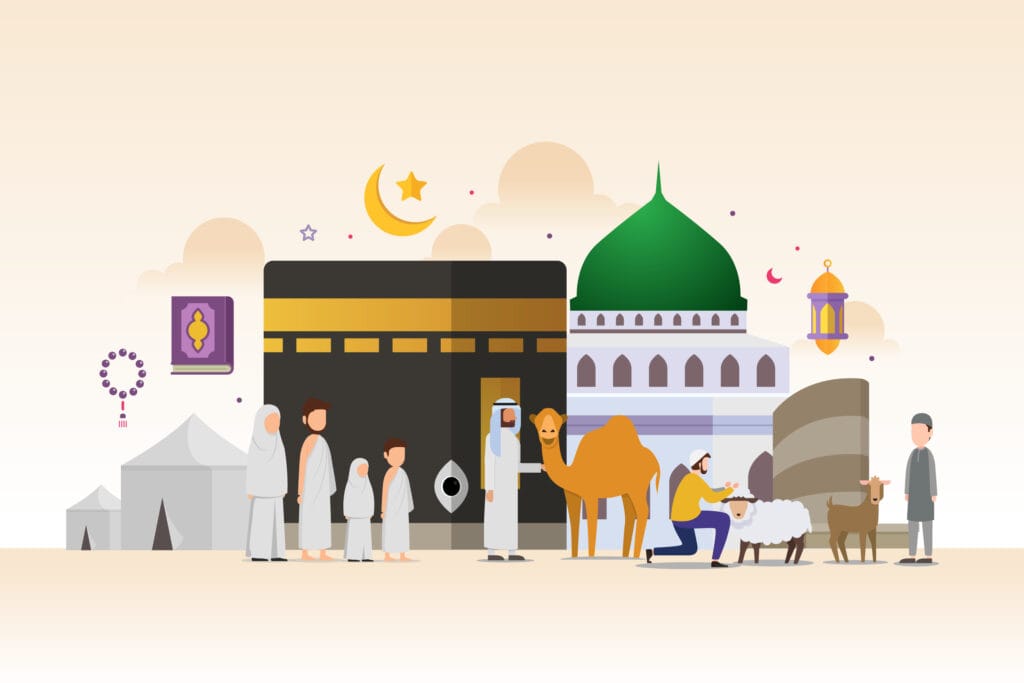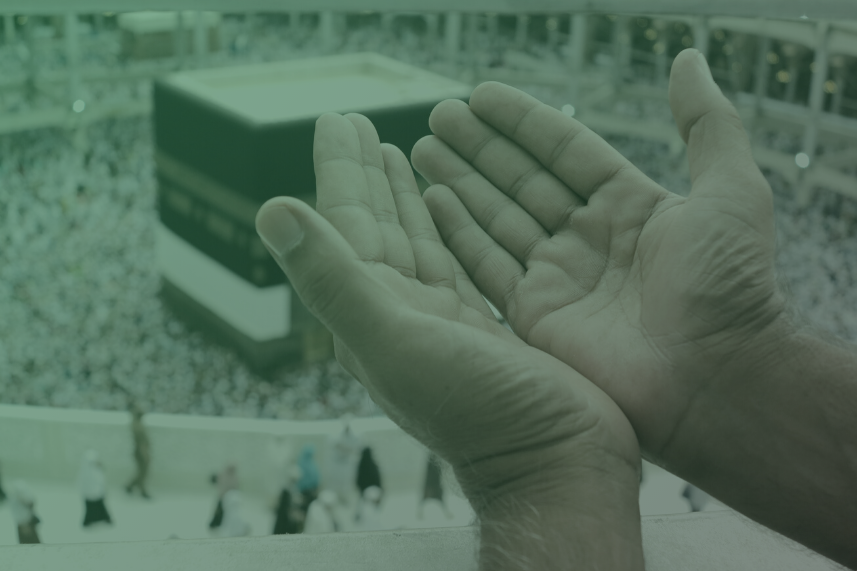The month of Dhū al-Ḥijjah is one of the four months in Islam mentioned in the Qur’an At-Tawbah verse 36. In this month, sins are washed away; rewards are multiplied. The implementation of Hajj and qurban in Dhū al-Ḥijjah marks the bottom of this month, a glorious month favoured by Allah Almighty.
The First 10 Days of Dhū al-Ḥijjah
More specifically, the first ten days of the month of Dhū al-Ḥijjah became the most important days for performing worship and recommended sunnah practices. This practice follows the words of the Prophet Muhammad (peace be upon him), which reads:
“The most (afdha) or important day of the year is the Feast of Sacrifice (10 days of Dhū al-Ḥijjah ).” (HR. Ibn Hibban)
Not only the Messenger of Allah, Allah Almighty also said that the first ten days of the month of Dhū al-Ḥijjah were His beloved moments. This is stated in His words in the Qur’an:
“For the sake of Dawn and the tenth night.” (QS. Al-Fajr: 1-2)
Baca juga: Puasa Dzulhijjah, Ini Keutamaan, Tata Cara, dan Bacaan Niatnya
According to Tafsir Ibn Kathir, the tenth night in verse means the first ten days of the month of Dhū al-Ḥijjah. In these first days of the month of Dhū al-Ḥijjah, Muslims are encouraged to worship because the reward will be multiplied.
“Narrated Abu Hurayrah, from the Messenger of Allah, he said: There are no days that Allah prefers to worship than the first ten days of the month of Dhū al-Ḥijjah; one day of fasting in it is equivalent to a year of fasting, one night of setting up evening prayers is equivalent to praying on the night of power (Lailat al-Qadr).” (HR. Tirmidhi, 3/122)

Practices of the Month of Dhū al-Ḥijjah Besides Hajj and Sacrifice
As the creator of the universe, Allah Almighty has always been just. Even though we as Muslims have not been able to perform Hajj and sacrifice in the month of Dhū al-Ḥijjah there are still many rituals and practices of the month of Dhū al-Ḥijjah that we can do. Allah also promises that these worship and practices will produce multiple rewards for His servants. The Holy Prophet(saw) said:
فمن عجز عن الحج في عام قدر في العشر على عمل في بيته، يكون أفضل من الجهاد الذي هو أفضل من الحج
“Whoever cannot perform Hajj in one year, he can perform charity at his residence in the first ten days of Dhū al-Ḥijjah, then it is more important than jihad, which jihad is also more important than Hajj.” (Ibn Rajab RH)
Baca juga: Ini Keutamaan dan Makna Tawaf dalam Ibadah Haji dan Umrah
Here are five practices of the month of Dhū al-Ḥijjah that we can do in addition to Hajj and sacrifice:
1. Dhū al-Ḥijjah Fasting
Fasting is a charity that is recommended to be done in the first 10 days of the month of Dhū al-Ḥijjah. For this reason, there is the name of Dhū al-Ḥijjah Fasting. This fast is observed from the 1st to the 9th of Dhū al-Ḥijjah. However, specifically on the 8th of Dhū al-Ḥijjah it is called the Fast of Tarwiyah, and on the 9th of Dhū al-Ḥijjah it is called the Fast of Arafat.
2. Tarwiyah Fasting
The fast of Tarwiyah is observed on the 8th of Dhū al-Ḥijjah. The eighth day of Dhū al-Ḥijjah is the meaning of contemplation. This meaning is taken from three opinions that explain the three contemplations of God’s prophets on that day:
- Because of the contemplation of the Prophet Adam when building the Kaaba.
- Because of the deep contemplation of Prophet Ibrahim after dreaming that Allah Almighty slaughtered the child he loved.
- The contemplation of the pilgrim about what prayers will be offered on the day of Arafat.
On the eighth day of the month of Dhū al-Ḥijjah, Muslims are encouraged to observe the fast of the Tarwiyah sunnah. Its practice is the same as other Sunnah fasts.

3. Arafah Fasting
In addition to the Fast of Dhū al-Ḥijjah and the Fast of Tarwiyah, there is also the Fast of Arafat, done explicitly on the 9th of Dhū al-Ḥijjah. The fast of Arafat is recommended for Muslims who do not perform Hajj in Makkah. Implementing the Fast of Arafat is the same as the fasting of the Sunnah.
From Abu Qotadah, he said that the Holy Prophet(saw) said: “The fast of Arafat (9 Zul-Hijah) can wash away the sins of a year ago and a year to come. The fast of Ashuro (10 Muharram) will wash away the sins of a year ago.” (HR. Muslim no. 1162)
4. Takbeer and Dhikr
Multiplying dhikr is a highly recommended practice in the month of Dhū al-Ḥijjah. Remembrance, in this case, includes prayer, a form of dhikr that involves the glorification of Allah in Islam (tasbih), a form to praise or to the acclaim of Allah Almighty (Tahlil), the act of seeking forgiveness (istigfar), the act of praising be to Allah Almighty (bertahmid), and the act of saying magnification of God (bertakbir). This practice can not only be done in the month of Dhū al-Ḥijjah but can also be accustomed to our daily lives as Muslims.
Ibn ‘Abbas said, “Make your remembrance to Allah on the appointed days, namely the first ten days of Dhū al-Ḥijjah and the days of forbidden fasting (Tasyrik). Ibn ‘Umar and Abu Hurayrah once went out to the market in the first ten days of Dhū al-Ḥijjah, then they takbir, and then people takbir. Muhammad bin Ali also prayed after the Sunah prayer.” (HR. Bukhari)
Baca juga: Inilah 9 Amalan Sunnah Idul Adha yang Sebaiknya Umat Islam Laksanakan
5. Repentance (away from vices)
Avoiding immorality and repenting for sins that have been committed is our duty as Muslims. Allah Almighty also emphasizes this activity to His people to multiply repentance at the beginning of the month of Dhū al-Ḥijjah and do pretext deeds. In QS An-Nahl, Allah Almighty says:
“Then, verily your Lord (forgives) for those who make mistakes because of their foolishness, then they repent afterwards and correct (themselves). Verily, your Lord is then truly merciful.” (QS. An-Nahl: 119)
The practice of genuine/authentic (shalih) that we do in the month of Dhū al-Ḥijjah is privileged and loved by Allah and multiplied in reward. This practice is a blessing and gift from God to His servant. For that, we must be grateful for it sincerely by increasing our obedience to Him. The practices of the month of Dhū al-Ḥijjah mentioned above are not absolute. There are many other genuine/authentic (shalih) practices, such as prayer, almsgiving, and reading the Qur’an, which we should also do.



